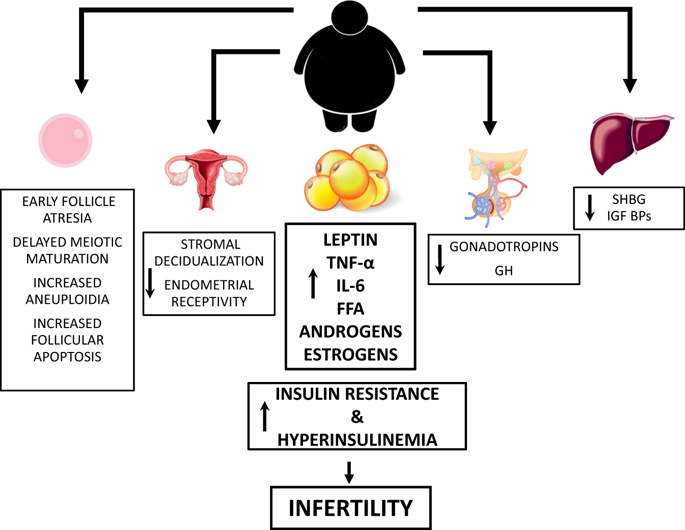International Journal of Obesity Supplements Pub Date : 2019-04-12 , DOI: 10.1038/s41367-019-0009-1 Alessandra Gambineri 1 , Daniela Laudisio 2 , Chiara Marocco 3 , Stefano Radellini 4 , Annamaria Colao 2 , Silvia Savastano 2 ,

|
Obesity is associated with infertility in women through multiple and complex mechanisms. Briefly, the adipose tissue through the production of many factors, such as leptin, free fatty acids (FFA), and cytokines may affect both ovarian and endometrium functions, with a final alteration in oocyte maturation and endometrial epithelium receptivity. In addition, through the development of peripheral insulin resistance obesity produces a condition of functional hyperandrogenism and hyperestrogenism that contribute to produce anovulation and to reduce endometrial receptivity and, therefore participate to cause infertility. Weight loss is able to restore fertility in most cases, but there are no practical indications to guide the clinician to choice the best method among increased physical activity, diet, drugs, and bariatric surgery.
中文翻译:

女性不孕:肥胖有何作用?
肥胖通过多种复杂的机制与女性不孕症相关。简而言之,脂肪组织通过产生许多因子,例如瘦素、游离脂肪酸(FFA)和细胞因子,可能会影响卵巢和子宫内膜的功能,最终改变卵母细胞的成熟和子宫内膜上皮的容受性。此外,通过外周胰岛素抵抗的发展,肥胖产生功能性雄激素过多症和雌激素过多症的病症,其有助于产生无排卵并降低子宫内膜容受性,因此参与导致不孕。在大多数情况下,减肥能够恢复生育能力,但没有实际的迹象可以指导临床医生在增加体力活动、饮食、药物和减肥手术中选择最佳方法。











































 京公网安备 11010802027423号
京公网安备 11010802027423号